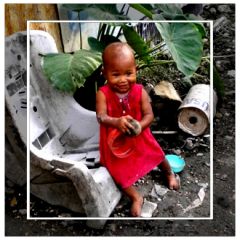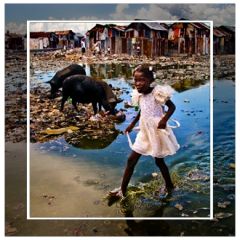Wharf Jeremie, Belem Mission, Haiti
Wharf Jeremie, Belem Mission, Haiti
by Janusz Gawronski
Translation from Italian by Dario de Judicibus

The tiny street unfolds between the shacks of the slum. It seems drawn by an invisible city planner. A real road, a driveway, between inhabited gutters and debris: in the absence of light-water-sewer-drain-schools-phones-transport, is the only public service available here at the Wharf. Infinite black faces live there, such as in a backyard.
I am walking slowly, without giving importance to the turned on camera. I am collecting images that I will use to narrate. I am mentally recording disturbing scenes. The Hell is not addictive. I am drawing questioning glances. Here at the Wharf people must be accustomed to the role of circus freaks. A few days ago, a South Tyrolean troupe refused to film the orphanage on the point, because it was “too good and you do not see the poverty”. If one day someone will find some oil here, humanitarian tourism would lose a popular destination.
People wash themselves, evacuate in public. There is a clear etiquette in this respect, as in all human congregations. The act of indulging in bodily functions happens on the banks of the sewer-river, made of dry trash, or in the open space between the barracks and the coast. Human beings establish a distance, a short one but always a clear-cut, for these areas destined for their needs. The person turns to the audience. He or she squats, then remains in that position for several minutes. I do not know how they clean up. Without water or toilet paper, they might use their hands. Maybe only the left one, as in Arabic countries. I guess that doing business be not a frequent gesture, if you have not dysentery, because here people do not eat a lot and drink even less.
If you meet their gaze in these situations, they return it amused, triumphant. “Seeing each other” is a prank, an implicit leg-pull. They seem to say: wait, that in a bit it is your turn. Blacks pigs of all sizes ensure the prompt removal of those trophies. Thousands of releases and, paradoxically, not even a hint of a specific smell of feces, wherever the wind speeds.

The girl is on the side of the road. She washes herself. She should be sixteen, maybe twenty years old. She is pretty. Hair is shiny, neat. Apart some sloppy and toothless old woman, all females of all ages show off cured heads with finely braided hairstyles. She is carrying a basin. She carried her bucket of water from the main road. She had to pay for that water intended for the toilet. I see some bubble bath. Even at the Wharf, the hygiene is a choice too.
She is more naked than dressed. You can see her generous boobs. She notices my gaze. She reacts with modesty. It is intended that she should be there, in that state. It is intended that she can show herself, in respect of social rules. It is intended that she should try to cover herself, and that the gazes should move elsewhere. A couple of meters on the left, there are three little girls. Next to them a sentry: a man in his thirties. A husband or a senior brother.
Around this very intimate microcosm, at least a hundred other souls are statically bustling. Two women are chatting, one has a basket on her head. The men turn looks harder. Someone is resigned. I read awareness and frustration for their own status. They do not cross the road. They do not ask for a job. Rarely they have it, so that they would lose their dignity if they do.
Four gentlemen are playing cards. Insults and recriminations are exchanged, as in any respecting game. One is stocky, bald, with a striped large shirt, sleeveless. The one facing away is shirtless. Another one is the double of Bob Marley, Christmas tree version. He has a lot of colorful clothespins attached to the hair and the beard. For each point lost, a clothespin. No one laughs. The social sanction is already public, expressed in the locally encoded form.
A pig dodges as I pass. It is black, and well-fed. It is the only animal happy to feed in the sewer. It would not be healthy to make sausages of it.
Children have stopped the games, they look at us. Between me and them, a stellar distance, as between the slums and the Air France flight over our heads. You do not see balls in Wharf Jeremie. What children use to play with?
The Missão Belém is an initiative born in 2005 in Brazil, which aims to give a family for those who have no family. The first house was founded in Jarinu, in the State of São Paulo, with eight guests. Today, it operates with a hundred houses, simple ones, where you live solidarity. The Mission was founded by the missionary Cacilda da Silva Leste and by Father Giampiero Carraro, to live in communion with our brothers and sisters who are suffering and living on the street. The houses of the Mission are in the majority in the State of São Paulo, but one was opened in Haiti, a country devastated by an earthquake and a terrible reality to date; another in Italy, home to some Brazilians, and a third in Bosnia, where the war has produced 200 thousand deaths, mostly young people, providing assistance to 150 poor people, especially the abandoned elderly.




















Please use Facebook only for brief comments.
For longer comments you should use the text area at the bottom of the page.
Facebook Comments